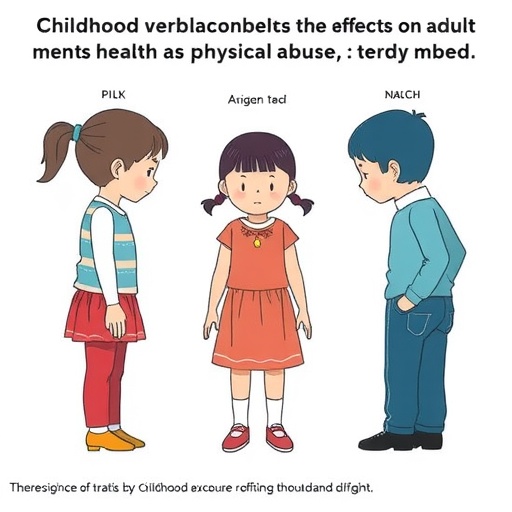A groundbreaking new study published in BMJ Open has unveiled compelling evidence that childhood verbal abuse carries mental health consequences in adulthood comparable to those of physical abuse. This revelation emerges from an extensive intergenerational analysis involving over 20,000 participants in England and Wales, tracking birth cohorts from the 1950s onward. It challenges the prevailing notion that verbal abuse is a lesser harm and underscores the need for comprehensive strategies addressing all forms of child maltreatment.
The research leverages retrospective data pooled from seven studies conducted between 2012 and 2024, utilizing standardized measures such as the Adverse Childhood Experiences (ACE) questionnaire and the Warwick-Edinburgh Mental Wellbeing Scale. Through these tools, the researchers assessed the lifetime prevalence of physical and verbal abuse during childhood and examined their separate and combined associations with adult mental wellbeing. The findings reveal a stark increase in the risk of low mental wellbeing linked to both abuse types.
Physical abuse in childhood has long been acknowledged as a significant predictor of adverse mental and physical health outcomes, including anxiety, depression, substance misuse, and chronic diseases like cardiovascular disorders and diabetes. This study reaffirms those associations but strikingly points out that verbal abuse—a form of toxic stress often regarded as less tangible—wields an equally devastating impact on long-term mental health. Verbal abuse’s insidious nature frequently means it goes unnoticed or is minimized, yet it profoundly affects neurodevelopment and psychological resilience.
Analyzing the data quantitatively, experiencing childhood physical abuse was associated with a 52% increase in the likelihood of low mental wellbeing in adulthood. In contrast, verbal abuse corresponded to a 64% increase, demonstrating an even stronger relationship with poor mental health outcomes. Notably, individuals subjected to both abuse types exhibited more than double the risk compared to those unexposed, illustrating a synergistic detriment to adult psychological wellbeing.
Further granularity emerges when dissecting specific facets of mental wellbeing. The prevalence of individuals reporting feelings of social disconnection—specifically, rarely or never feeling close to others—rose from 8% among those with no abuse history to over 18% for those experiencing both verbal and physical abuse. Such social withdrawal signals fundamental challenges in forming and maintaining interpersonal relationships, which may perpetuate cycles of psychological distress.
A temporal trend uncovered in the study is particularly illuminating. While rates of reported physical abuse have halved among those born post-2000 compared to earlier decades, verbal abuse prevalence has alarmingly increased from 12% in pre-1950 cohorts to approximately 20% among those born after 2000. This shift suggests changing child-rearing practices and societal norms may have curbed overt physical violence but inadvertently heightened the risk of psychological maltreatment.
Compounding these trends is the socioeconomic gradient observed. The highest rates of both physical and verbal abuse occur in regions marked by greater deprivation, exposing the intertwined nature of poverty, environmental stressors, and child maltreatment. Such findings highlight the urgency for targeted interventions addressing social determinants alongside direct prevention efforts.
Gender differences further nuance the study’s insights. Men were more prone to report infrequent feelings of optimism, usefulness, and social closeness, whereas women more frequently indicated rarely feeling relaxed. These differential patterns underscore the complex interplay between abuse experiences, gendered psychological responses, and coping mechanisms.
Importantly, the study cautions against interpreting causality from its observational design but robustly emphasizes the significant correlations revealed. Recall bias remains a limitation due to reliance on self-reported retrospective accounts. Moreover, the inability to measure abuse severity, chronicity, or age of onset limits granularity but does not diminish the overall message regarding verbal abuse’s profound and underestimated harm.
These findings carry significant implications for policy and practice. Over recent decades, legislative and social interventions have effectively curtailed physical punishment of children, driven by increasing recognition of its harms. However, this progress may inadvertently create a void if verbal abuse—once normalized or overlooked—continues unaddressed. Without parallel public education and support frameworks guiding positive parenting and child discipline, the potential exists for a substitution of one harmful form of abuse with another equally detrimental one.
The research advocates for enhanced awareness among clinicians, educators, policymakers, and caregivers about the covert and persistent damage inflicted by verbal abuse. Strategies aimed at promoting healthy child development must therefore expand their scope beyond preventing visible physical injuries to encompass protecting children’s psychological and emotional welfare comprehensively.
In an era where mental health burdens continue to surge globally, understanding and mitigating early life adversities such as verbal abuse represent critical public health priorities. By shedding light on verbal abuse’s comparability to physical abuse in long-term mental health outcomes, this study calls for a paradigm shift. It emphasizes a holistic safeguarding approach that leaves no child at risk of the silent, yet deeply scarring, wounds of verbal maltreatment.
Ultimately, the research illuminates a pressing need for integrated interventions that not only eliminate physical violence but also root out psychological harm in childhood. Only then can society ensure a future where children are nurtured in environments that foster enduring mental wellbeing and resilience across the lifespan.
Subject of Research: People
Article Title: Comparative relationships between physical and verbal abuse of children, life course mental well-being and trends in exposure: a multi-study secondary analysis of cross-sectional surveys in England and Wales
News Publication Date: 5-Aug-2025
Web References: 10.1136/bmjopen-2024-098412
Keywords: Child abuse, Mental health




